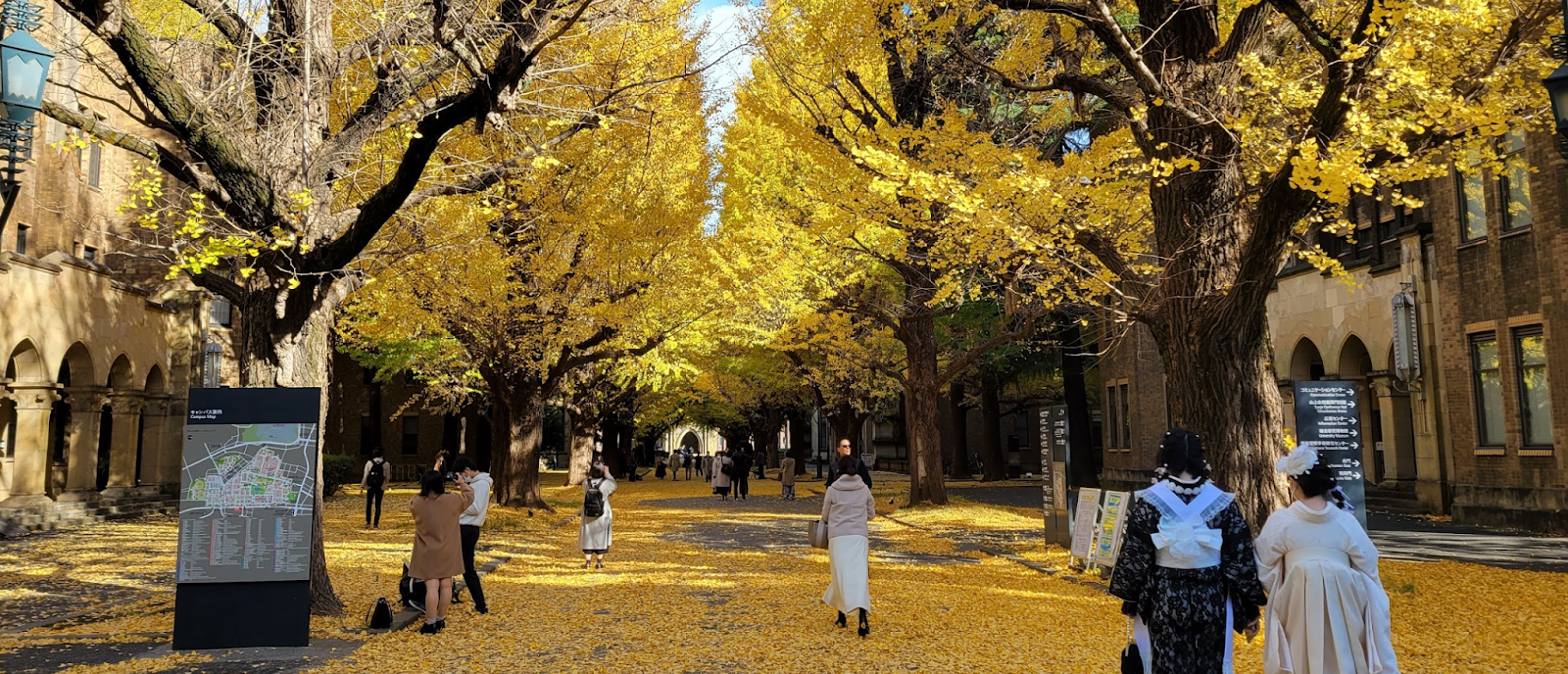Grad school in Japan: my experience doing a Master of Sciences in Computer Science

Johannes Mario Meissner
My journey in Japan began with an unconventional scholarship program called Vulcanus in Japan, which allowed me to take a Japanese language course and intern at a major Japanese company. I wrote all about it in my previous TokyoDev article.
This time, I wanted to describe the continuation of this journey, a master’s program in computer science at the University of Tokyo.
How I ended up in a graduate program
While still in the middle of my Vulcanus program in Japan, I was offered a scholarship from a Spanish bank that would cover the tuition fees for any international graduate school program and provide a monthly stipend. I originally aimed to get accepted into one of the highly-regarded American universities.
However, things didn’t turn out as I expected. The COVID-19 pandemic hit right around when the admissions process was closing, and international travel became extremely difficult. Not surprisingly, I couldn’t make my original plans work, so I shifted my attention back to Japan. One of the few universities still accepting applications was the University of Tokyo, so I took my chances and went all in for this last opportunity.
I was lucky to pass the entrance exam
The entrance examination for most programs at the University of Tokyo is known to be very challenging. This is especially true for the highly in-demand computer science graduate program.
The written exam for the computer science degree is usually divided into a computer science section and a math section. Past exam iterations are made public for you to review and prepare, but the breadth of content is so wide that realistically, at least half a year of full-time preparation would be needed to be comfortable with all the topics included. I locked myself into my room and studied for months, praying that this or that topic would be kept out of the exam.
Math was definitely a major weakness for me, and my chances of doing well on that one were almost zero. However, the planets aligned for me, and it was decided that due to the extraordinary circumstances (COVID), the math exam would be replaced with an additional oral examination covering computer science topics. Imagine my excitement!
While I did okay on the written exam, my strong performance on the oral exam was ultimately the decisive factor for my admission into the program. To this day, I consider myself extremely lucky for how things turned out.
Graduate programs in Japan are all about research

Most graduate programs in Japan are two-year long, highly research-focused programs. When applying, you not only select the degree program, but also a research laboratory. Most of your time will be dedicated to research activities in the lab, including weekly lab meetings and tasks that your professor asks you to do. You’ll be encouraged to write papers, participate in competitions and events, and share your knowledge and results with others.
This might vary among universities and programs, but in my case, the amount of required coursework credits was fairly low, and most classes were not very challenging. It is possible to finish all required coursework credits within one or two semesters and have your second year fully dedicated to your research and thesis.
Given this tendency for graduate schools in Japan to be so research-focused, whether or not you enjoy it will depend mostly on your inclination toward research. Graduate school might be overwhelming if you are looking for a quick way to earn credentials for job hunting.
Finally, learning all you can about your prospective professor before applying to the program is very important. Some are very relaxed and don’t ask much from their students, while others are extremely demanding and will expect you to work 10 hours per day while publishing something every other month. Make sure when picking a professor that you pick one who matches you not only in research topic but also in work style.
You won’t fit in as a foreigner, but that’s okay
You probably won’t be surprised to hear that fitting in with Japanese students is very hard, as they will mostly form closed groups among themselves. You might have more luck among your lab-mates, especially those comfortable with using English. I made several Japanese friends myself through this approach. On the plus side, you will most likely not be the only foreigner in your degree, especially if it’s an English-based program, so there will be many like-minded foreigners to befriend. Finally, you will also find it helpful to participate in extra-curricular activities such as sports, competitions, on-campus concerts, etc.
My graduate school made no particular distinction between English-speaking international students and Japanese students. Courses in both languages are mixed into the same curriculum, and everyone is free to choose between both. For that reason, it is easy for international students to choose their level of comfort with Japanese and take steps accordingly, such as collaborating with the Japanese students of your lab or joining a Japanese-language course. I personally didn’t find myself comfortable enough to follow a high-speed Japanese lecture, so I stayed on the English side. Looking back, I wish I had pushed myself a little more. The labs are also usually fairly multilingual. Most professors will talk to you in English if that’s what you prefer.
With that said, this can vary from program to program. If your program is tailored fully toward foreign students, you might not find the chance to interact with Japanese students. It’s best to contact currently enrolled students if you want to know more about those details before applying.
I had a blast, and so might you

My experience as a master’s student at the University of Tokyo was extremely unique due to COVID-19. Most courses—and even lab activities—shifted to a remote system. Given how charming the Hongo campus is, I felt quite sad not being able to make the most of it. With that said, I had one in-person course that I really enjoyed, and there are multiple facilities that students can make use of, such as the library and the gym.
My lab was large, with almost 15 active students participating in the weekly activities. My favorite was the paper reading sessions, where each week, one student presented a paper on a related topic. There was a significant number of foreign students, and most activities were carried out in English.
Thanks to the great lab environment, excellent supervisor support, and an eagerness to make something out of this program, I published two research papers at high-profile conferences (Debiasing Masks: A New Framework for Shortcut Mitigation in NLU and Embracing Ambiguity: Shifting the Training Target of NLI Models). The first of those conferences was unfortunately fully online (thanks again, COVID!), but I was able to participate in-person in Abu Dhabi for the second one. The lab will usually provide financial support for activities like these and cover the associated costs.
A degree from a Japanese institution can be valuable in Japan

A Japanese degree will greatly boost your job-hunting in Japan. It is a sign that you have spent two years in the country, been able to enroll in a local institution, and followed its rules and norms. Any Japanese company looking at your resume will feel more confident about you being able to blend into their workforce, too. If your university has some amount of prestige, then that will additionally reflect on you as a graduate.
Notably, Japanese companies usually don’t expect much from the actual outcomes of your degree. Your research topic or academic performance will have little impact if any at all. A staggering number of Japanese graduates work jobs that have nothing to do with the field they majored in. History major, applying for an investment analyst position? All good!
Internationally, a Japanese degree is usually not as well recognized as they are not very well known. I would consider them to be at a similar level of recognition to an average European university.
Is this the right choice for you?
If you have the time, are willing to dive deeper into the academic research world, and plan to continue working in Japan, a master’s degree with a Japanese institution would be a great option for you. You will most likely have a great time and the degree will offer a significant boost in your job hunting.
If any of the above is not true, however, there are several other options to consider. Professional training programs or technical schools (専門学校, senmon gakkou), boot camps, and several other similar paths exist that can boost your credentials in Japan. However, if you are not planning to pursue a job in Japan, a degree with better international recognition might be a better choice.
One final reason to consider a Japanese graduate school is that it can be a way into the country if you are applying from abroad. Universities will sponsor a student visa for all international students, so it’s an easy option to set foot in Japan and use your time as a student to figure out your next steps.
Personally, my choice of joining graduate school in Japan definitely paid off. Not only did I achieve several strong research outcomes, but I also had a great time doing so and finally landed a great job after graduation. I think back fondly on my time as a student in Japan due to the many friends and unforgettable memories I was able to make.